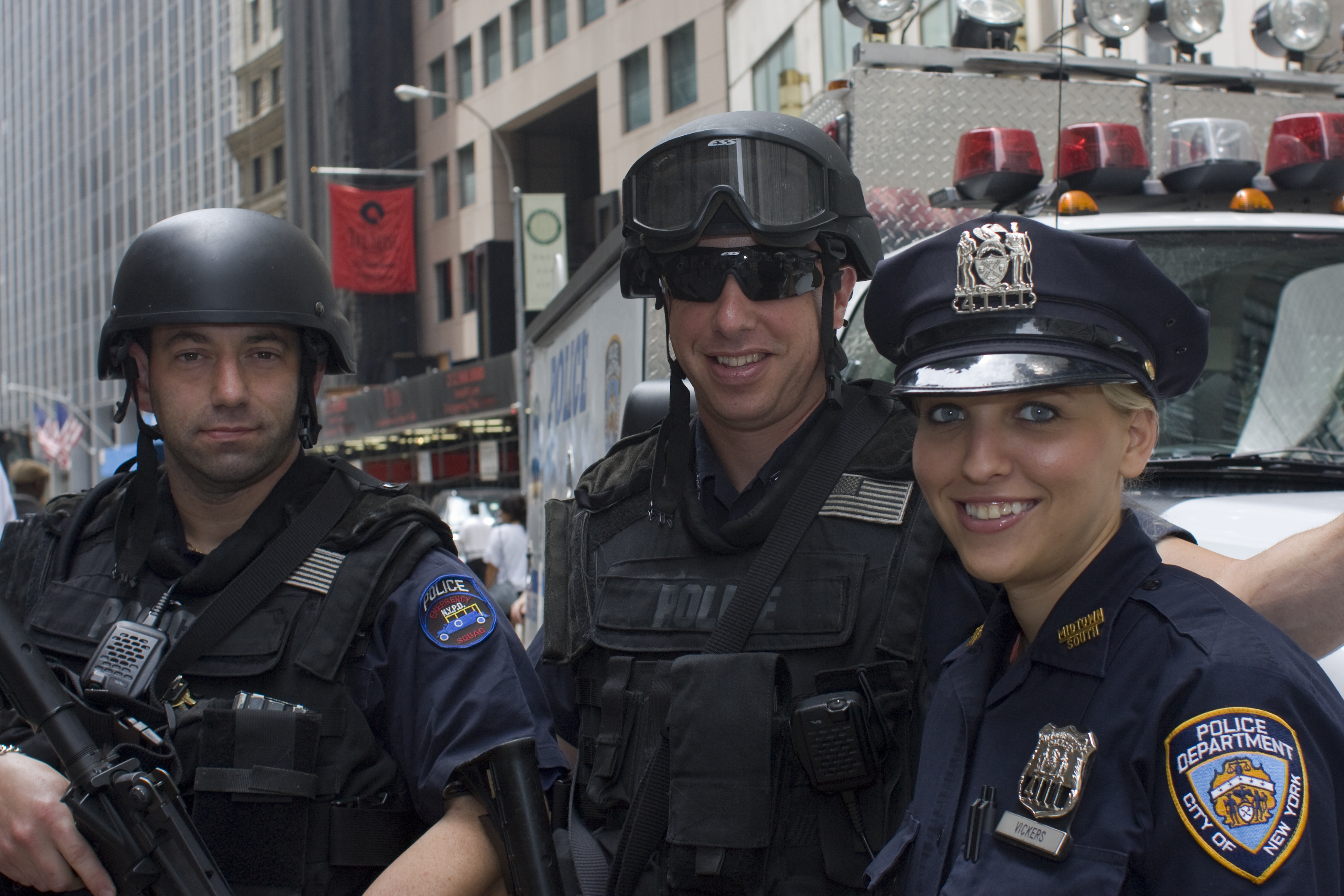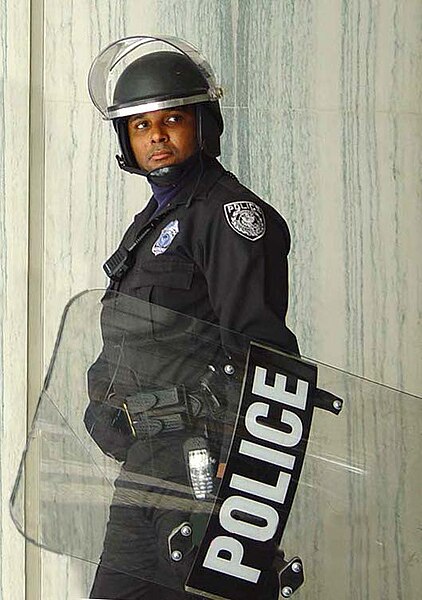Chapter Two: Policing
Chapter 2: Policing in America

Author: Nick Allen
Source
This file is licensed under the Creative Commons Attribution 2.0 Generic license.
History of Policing in the United States
Early Police
- Not focused on fighting crime instead were used to control certain people such as slaves.
- Other duties included:
- Most were volunteers because a force was $$$$
- As the population grew the need for public order grew
Early Police Experience:
- English Model – Constables and watchman
- Governor was in charge of hiring Sheriff, picking juries, and managing jails/prisons
- 1730 – Had to make it a law in PA prohibiting strong liquor to any person under arrest, which means?
First Police Department
- 1801 in Boston a formal night watch shift
- Night watchmen were paid 50 cents a night
- For almost 3 decades this system was only on in United States.
- 1833 Philadelphia first city to employ both day and night watchmen in order to prevent crime
- Five years later Boston organized first police dept. of 6 full time officers
This lead to police more concerned with the interest and protection of the political party than its citizens.
Major Eras in Law Enforcement
- Political
- Reform
- Community
- Homeland Security
Law Enforcement Agencies

Author: CHPSocialMedia
Public Domain
- Municipal
- Sheriffs
- State and Highway Patrol –Note 1-4 + Texas Rangers
- Homeland Security
- Border Patrol
- Customs
- Secret Service
U.S. Marshal
Job Description:
- Provide security at federal courts, control property that has been ordered seized by federal courts, and protect government witnesses who put themselves in danger by testifying against the targets of federal criminal investigations.
- Transport federal prisoners to detention institutions and hunt and capture fugitives from federal law.
What Kind of Training Is Required ?
- A bachelor’s degree or three years of qualifying experience, which includes work in law enforcement, correctional supervision, and volunteer teaching or counseling.
- A rigorous seventeen-and-a-half-week basic training program at the U.S Marshals Service Training Academy in Glynco, Georgia.
Annual Salary Range
$37,000–$47,000
Federal Bureau of Investigation (FBI) Agent
Job Description:
- Primary role is to oversee intelligence and investigate federal crimes. Agents might track the movement of stolen goods across state lines, examine accounting and business records, listen to legal wiretaps, and conduct undercover investigations.
- Special agent careers are divided into five paths: intelligence, counterintelligence, counterterrorism, criminal, and cyber crime.
What Kind of Training Is Required ?
- A bachelor’s and/or master’s degree, plus three years of work experience, along with a written and oral examination, medical and physical examinations, a psychological assessment, and an exhaustive background investigation.
- Critical skills required in one or more of the following areas: accounting, finance, computer science/information technology, engineering, foreign language(s), law, law enforcement, intelligence, military, and/or physical sciences.
Annual Salary Range
$61,100–$69,900
DOJ – Department of Justice
Federal Law Enforcement Agencies
- Department of Justice
- Federal Bureau of Investigation
- Drug Enforcement Agency
- Bureau of Alcohol, Tobacco, Firearms, and Explosives
- U.S. Marshals Service
- The Department of the Treasury
Private Security
- Privatizing law enforcement
- Citizen’s arrest
- The deterrence factor
Responsibilities of Police Officers

- Enforce Laws
- Provide Services
- Prevent Crime
- Preserve Peace
How does someone become a Police Officer?
- Basic Requirements
- U.S. Citizen
- No felony convictions
- Valid Driver’s License
- Minimum 21 years of age
- Pass a drug test
-
FBI Background checks
-
Educational, military and driving records
-
Credit checks
-
Polygraph
-
Previous Employers
- The training period
- Academy training fitness
Six Levels Fitness Test
Below is an h5p activity that requires users to drag an action done in this fitness test to the appropriate level at which it occurs. The dropbox for the begining of the test, level one, is labeled "Level one Dropbox". All the other dropboxes are labeled accordingly for each of the six levels. Order the actions in the correct sequence for the six levels.
Drag the actions to the correct level of the fitness test where they occur.
Other Information
Age
- 21-45 usually age to accept.
- 20 % of police lie during the screening process and are not allowed to continue.
Education
- 83% of local police require at least high school
Two Concepts in Training
- Classroom = 637 hours
- Field Work = 417 hours
Rookies
- Minorities and Women
- #’s have steadily increased
- EEO 1972 set stage for Affirmative Act.
- Women and Minorities today are in lead roles such as Chiefs
Do women make bad Cops?
- Myth - Women under constant pressure to prove effectiveness verse male counter parts
- REALITY - Citizen prefer to deal with female officers, are less aggressive, use verbal skills better than males in hostile situations, 43 to 1 with regard to cases of misconduct male and female
Police Efficiency
How Do We know police are good and providing services?
- Incident – Driven Policing - A reactive approach to policing that emphasizes a speedy response to calls for service.
- Response Time
- A measurement of police efficiency based on the rapidity with which calls for service are answered.
- Differential Response - time is adapted to the seriousness of the call.
- Hot and Cold Crime
Arrest Rates
- The more arrest does not lead to less crime.
- Problem ?
REFOCUS on the COMMUNITY

Source
-
- Citizen Satisfaction – How do you rate them?
- Community Policing -community support for and cooperation with police in preventing crime.
- Problem Solving Policing - police to identify potential criminal activity and develop strategies to prevent or respond to that activity.

Source
Wilson and Killings Theory that a neighborhood in disrepair signals criminal activity is tolerated in those areas.
- These neighborhoods send out signals that crime is tolerated.
- This disorder promotes fear among citizens
- Must reduce the fear to reduce the crime.
Backbone of the department
Life on the street is not an easy task
Purpose of Patrol
- Deterrence of crime by maintaining a visible police presence
- Maintenance of public order and sense of security in the community
- The 24 hour supervision of services not related to crime
The First 2 are deterrence based. The third is more of view of police as “public servants”
Patrol Activities
- Preventive Patrol - By maintaining the presence in a community officers can prevent crimes from occurring, 40% of time
- Calls for Service -Responding to citizens emergencies and complaints, 25% of time
- Administrative Duties - Patrol time and doing the required paperwork, 20% of time
- Officer Initiated Activities - Contacts with citizens, stopping motorists, questioning pedestrians, 15% of time
Two Types of Patrol
- Directed Patrol
-
Strategies that are designed to respond to specific criminal activity at a specific time.
-
“Flooding the hot spots”
-
- General Patrol
-
Rely on police officers monitoring a certain area with the goal of detecting crimes in progress or preventing crime due to their existence.
-
Kansas City Experiment
- Control Beat
- Proactive Beat
- Reactive Beat
Outcome of Experiment:
Increasing or decreasing patrol had little to no impact on crime, public opinion, police response time, and traffic accidents.
Police Investigation

Source
- Make up 15% of police
- are the most common.
- Why is TV version so nice?
- Vice crimes – Prostitution, gambling, porn
- Confidential Informant – A human source for police who provides information concerning illegal activities that he/she was/is involved. Some are $ some get breaks
Police Subculture
- Values and perceptions that are shared by members of a police department.
- These are formed in environments involving stress, danger, boredom and violence.
Socialization - Policization
- Process through which a police officer is taught the values and accepted behaviors of the police subculture:
- Include:
- Academy
- Field Training (Senior Officer)
- Initial Felony Arrest
- Using force the 1st time
- Using or witnessing deadly force
- Major Traumatic events
Blue Curtain
- The value placed on secrecy and general mistrust of the outside world shared by many officers.
- It is a metaphor that separates them from normal citizens.
Police Cynicism
- The view that citizens are weak, corrupt, and dangerous.
- Officers are exposed to civilians at their worst and this can affect the officers performance.
Use of Force
- Reasonable
- The degree of force that is appropriate to protect the police officer and other citizens but is not excessive
- Deadly
-
Force applied by an officer that is likely or intended to cause death.
-
Police Corruption
- Bribery – Officer Accepts money in exchange for favors. What are favors that officers can provide for you?
- Shakedowns – Officer attempts to coerce money or goods from a citizen or criminal
- Mooching – Police officer accepts gifts. Grass Eater and Meat-eaters
Internal Affairs Unit
Ethics in Policing
The rules or standards of behaviors governing the profession, aimed at fairness and rightness of actions
Ethical Dilemmas
Happen for a Few Reasons in Policing:
- Some officers just do not know the right course of action to take.
- Officers have difficulty doing what they consider to be right.
- Officers might find the wrong choice very tempting.
Elements in Ethics
- Discretion – How officers need to act.
- Duty – moral and manner of actions
- Honesty – is the policy
- Loyalty – hard at times because you are loyal to :
- Partner, department, community
- Officers need to ask Themselves three Key Questions
- Is it Legal?
- Is in Right?
- How does it make me feel about myself?
Investigators
- Knowledge in ?
- Creative
- Patient
- Persistent
Stages
- Report a crime
- Initial Investigation
- Case Screening
- Follow up Investigation
- Case Prep.
- Prosecution
First Responders
- Rapid Response
- Planning routes
- Need to take charge of media, witnesses, offenders.
- Parities at Scene:
- Emergencies
- Secure
- Investigate
Conduct
- Question
- Canvass
- Measure
- Search
- Process
- Record
Crime Scene Investigators
- Specialty in organized scientific collection and processing of evidence
-
Collect, handle, and process all physical evidence
Types
-
Proactive
-
Knowing before the crime
-
Prostitution Sting
-
Tend to be proactive and are COVERT (secret) using decoys
-
-
REACTIVE
-
Waiting until the crime has occurred
-
Based on citizen complaints that involves a follow up
-
Unknown Rules of Operation
- Watch out for you Partner first
- Don’t EVER give up another cop
- Be aggressive but not eager
- Don’t Get involved in another guys sector
- Protect your ass through documentation
- Don’t talk too much or too little
- Never take on the Sergeant by yourself
-
Hold up your end of the work
-
If you get caught don’t implicate anyone
-
Never trust the new guy
-
Never tell anyone more information then they need to know
-
Don’t look for favors
-
Know your boss
-
Don’t do the boss work
-
Don’t trust the boss to look out for your best interest

